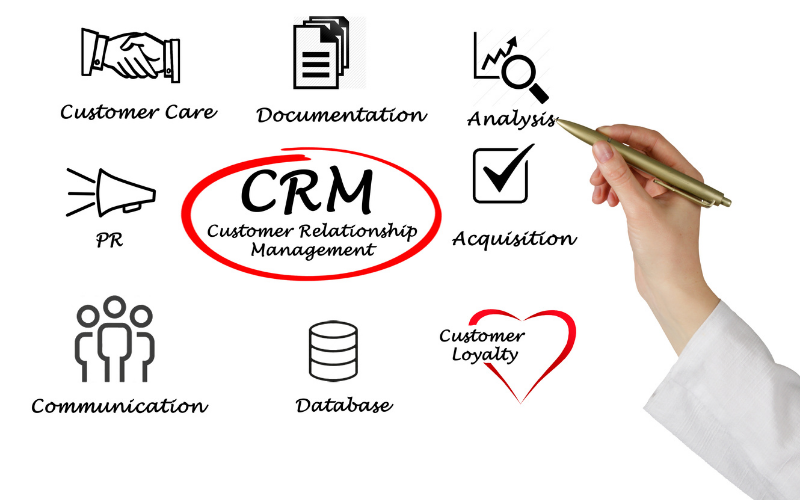Why Customers Stop Buying and How to Avoid Unnecessary Losses.
paul lloyd • March 5, 2024
Have you ever lost a client without even knowing they were looking around?
For even the most “on the ball” Salesperson this is probably a very real reality. You lose clients without knowing they were looking. Less than 4% of your customers will tell you if they are unhappy so you may never know if you have a customer on the fence. There is something very British about not complaining about poor service, so here we take a look at the reasons why your customers may leave and change to another competitor.
Why Clients leave...
Often this is through no fault of your own…
• 4%
of clients either "die", move away or develop other relationships
• 9%
of the time it is for competitive reasons, they grow too large for you to handle or their requirements change, and you can no longer service them.
• 5%
of clients change management or ownership and use their other existing relationships.
But often it IS your fault…
• 14%
of clients leave due to Service/Product dissatisfaction. You did not keep their ‘service’ up to date, and a competitor introduces an innovative range of services.
• 68%
stop buying because of a perception that you have lost interest.
So, what actions can I take to retain those 68%?
The top priority is to prevent any hint of a perceived attitude of indifference on your part so be sure to;
1. Ensure you thank them
for your business once the sale is complete.
2. Schedule regular emails
that thank customers again for their business, and be sure to repeat where/ how they go/get for further service and support
and make offers of new products.
3. Schedule regular meetings with existing clients
using your CRM system.
4. Regularly treat all clients as new business
using procedures like site surveys and meetings involving all the key players in the client meetings to review progress to date, discussions of the product and more.
5. Determine the customer’s next need and remind them of your company, its products and services by email, phone, or direct mail.
The main point here is to ensure your customers feel appreciated and those that feel looked after are unlikely to fall into the 68%.
Plan for customer losses – be proactive
Are you guilty of any of the below;
• You send an invoice each month but have no other contact
• You believe service is so good they would not look anywhere else
• There’s no contact unless something is going wrong
• You keep passing their account to the newest member of staff to manage
One thing is a given, you will lose clients along the way, so if you answered yes to one or more of the above it is good practice to put a plan in place to replace them, however, you may not feel confident in putting together a thoroughly planned sales campaign or maybe you just don’t have the budget, but it’s KEY that you plan something NOW.
Some low-key low-cost ideas
- Invest in a good CRM system to enter contacts and opportunities so that they are not lost and forgotten, Build an opportunity Calendar. Use the system in all aspects of your business as your one truth.
- Have a Referral Scheme - most companies start in a small way with the owner (usually technical) having a couple of contracts, and then there’s growth over time through recommendation and referral. There comes a time when this comes to an end. So, we look at a referral scheme and offer a bottle of wine or a case of something. This tends to be a token gesture and as such delivers very little. So why not offer something of real value like a 10% discount on their support contract for each new customer they refer. A referral would be when they introduce you to a prospect, or maybe organise your first meeting. Not just a name and address on the back of a scrap of paper.
- Regular Networking Events - You need to be seen so that other business owners know who you are. There are many of these events; don’t get overwhelmed, just set yourself a goal of attending at least one event each month. Build a small database of the people you meet and send them regular updates and news.
- Executive Briefings - Hold regular executive briefings with your clients; invite them to bring a friend. These do not have to be an expensive or big event just a small room with a few people discussing a proper business issue.
- Social Media - Build a following and regularly feed interesting and informative news.
The key to achieving long-term success in Sales is to see it not as a single event but as a process over time.
You need to take a view over a least 12-month period. It takes time and effort to generate success. Each time you do anything, the circumstance and environment will be different, and therefore it is not unreasonable to expect a different outcome. If you don’t plan to replace the customers that you lose on a yearly basis, then you will eventually end up with a large hole in revenues or no revenues.
If you would like to know more about planning and winning new business why not join our exclusive Sellerly Sales Clubs?
Thanks for reading,
Paul Lloyd, Sellerly.
MSP/ VAR Sales Problem Solver,
Sales Management Mentor
020 8148 6475 / paul@sellerly.co.uk
ALSO - Did you know I am a passionate bee enthusiast and keeper?
Here is your bee fact of the day;
£690 million is the mind-boggling amount that insect pollination is worth to UK crops each year. 76% of globally important commercial crops depend on insect pollination, which equates to 1 in 3 mouthfuls of food! (Soil Association)

Stages 3 - 4 - Beginning to Scale Up to Scaling Out So, in the last article, we looked at the two “starter” stages for a Sales business when it becomes successful and starts growing. Now we look at the pivotal maturing stages entitled loosely Beginnings of Scaling and Scale-Out. These stages occur when a f ew key things are met/achieved , usually, the business has an increasing number of teams and key sales roles in the organisation, 3-10+ Account Executives, multiple Sales Reps, and a growing Management team . Have a look below at the infographic and see where your organisation is measuring up. Where do you fit? How Sales Mature and Excellent are you / your organisation?

Stages 1 -2 - From a Founder Seller to a Small Sales Team So, congratulations, your Sales business is successful and growing, but is it maturing? Sales planning, whether at a company, department, or team level, is necessary for hitting targets and providing a framework for the whole business to strive towards, but do you know where you are in your Sales Maturity? A sales skills maturity model helps you evaluate your current sales skills and identify the areas that need improvement. Everyone needs a plan in their life, and anyone in Sales DEFINITELY needs a plan so we’ve put together this Infographic that details out the stages and milestones an organisation n eeds to typically follow to progress to Sales Excellence and Maturity . It’s a lot of information so we’ve focussed this week on Stages 1 and 2 only – Founder Seller to Small Sales Team , and our next blog will focus on Stages 3 and 4 – Beginnings of Scaling Up and Scale Out. Where do you fit? How Sales Mature and Excellent are you / your organisation?

Where are those New Clients? Over recent years I have spent a lot of time meeting and working with Managed Service Providers / VARs, and when discussing the biggest challenges in their business, it always comes back to the same thing over and over. WINNING NEW CUSTOMERS. This is a challenge that seems to affect any company of any size , whether their turnover is £500k or £40m. They need to win new contracts and new customers. Most of these businesses have reached the level that they have through recommendations and referrals or in the case of the bigger ones some acquisitions as well, rarely it seems going out and actively generating an opportunity and a sale.

Every company needs to do a sales forecast, whether weekly, monthly, or quarterly. Sales forecasts are an essential requirement for all stakeholders. Forecasting is a fundamental tool for businesses to plan, strategize, and make informed decisions. It helps them estimate future revenue, set goals, make informed business decisions, manage inventory, and supply chain, and improve cash flow management A good forecast means no surprises in store, funds in the bank and stock in the warehouse . Healthy forecasts protect companies from tough competitive and market conditions and position them better to adapt, plan, and thrive in the present and future. Based on current industry data and research, it seems most Sales leaders lack confidence in their forecasts, as well as the expertise to improve them. Disorganised and non-formal forecasting processes are a likely culprit. 93% of sales leaders are unable to forecast revenue within 5% , even with two weeks left in the quarter. 67% of organizations lack a formalized approach to forecasting altogether. 80% of sales organisations DO NOT have a forecast accuracy of greater than 75% . 55% of sales leaders do not have high confidence in their forecasting accuracy. (Stats from CSO Insights and Gartner)

A Trusted Advisor in the MSP market space is aiming for a long-term relationship, not short-term gain, and not to be seen as just a vendor, or worse still, the IT guy! So surely all TSP/MSPs want to be seen as trusted advisors to their clients, with the obvious benefits of repeat business, referrals, and introductions to your client’s other professional advisors. You do not need to “sell” your products or expertise when you are the Trusted Advisor. But have you put the time and effort in to be able to understand their business and what they are looking to achieve? Are you a true Trusted Advisor?

What is Lead Gen? “Lead Generation”, or “Lead Gen” for short, is the process of identifying and cultivating potential customers for a business's products or services. It is essential for businesses as it can turn interested parties into paying customers which in turn helps to create a stable customer base and drive sales, this then creates an ongoing cycle where customers give good reviews, which in turn results in customer loyalty and new business from that. Lead Gen also allows for a better understanding of a company's key customers and target markets, their needs and preferences thus allowing for more personalisation of products, services and marketing communications.

“If you are looking to sell to everybody, you will end up selling nothing to nobody” Six reasons why choosing your Niche/Target Market is so important Having a target market is crucial for sales because it allows a Salesperson to focus their efforts and resources on a specific group of customers who are the most likely to be interested in and purchase their products or services. Here are some key reasons why having a target market is important in sales:



